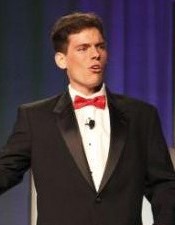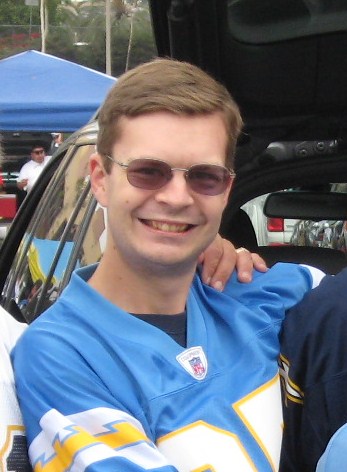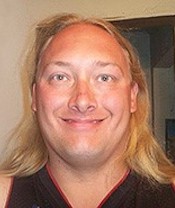ACE Community
- Pediatrician Affiliates
- Community Partners
- Autism Inspiration Honorees
The Autism Inspiration Honorees program was designed to honor someone with autism from the San Diego community. Selected honorees stand as an inspiration to others with autism, to parents with a newly diagnosed child, as well as to people without the disorder. Individuals selected for this honor participate in an interview or fill out a questionnaire that asks questions how austism has shaped who they are.
 Erik Weber was chosen as an ACE Autism Inspiration Honoree because of his accomplishments in life's adventures. His fun loving attitude and dedicated work ethic can be a source of inspiration to us all. Here are a few responses on how autism helped shape Erik Weber to be the person he is today.
Erik Weber was chosen as an ACE Autism Inspiration Honoree because of his accomplishments in life's adventures. His fun loving attitude and dedicated work ethic can be a source of inspiration to us all. Here are a few responses on how autism helped shape Erik Weber to be the person he is today.
1. What are you most proud of?
I am most proud of earning a Bachelor's Degree in International Development Studies at Point Loma Nazarene University, a Master's Degree in Public Administration at San Diego State University, my continuing accomplishments and involvement in Special Olympics, and being able to achieve these things in spite of doctors stating when I was age three that I would not be mentally older than eighteen months and that my parents should place me in an institution. That turned out to be college.
2. Do you have any special skills?
Memorizing and reciting comedic monologues and facts.
Public speaking.
Microsoft PowerPoint.
Microsoft Excel.
Research and analytical skills.
Running and other sports.
Video games.
3. How has having a diagnosis of autism helped you in life?
Having a diagnosis of autism has helped me empathize from a first-person perspective with other individuals who have learning differences and advocate regarding what is important toward fostering and cultivating undiscovered talent. The most relevant necessity for progress is trust, through which there can be education, theory of mind, and going outside of the comfort zone to grow as a person and develop new abilities. A child-driven education is important.
4. How has having a diagnosis of autism made your life more challenging?
I have had to deal with communication, behavioral, and learning issues. These are the hurdles one faces with Autism. The lack of communication would lead to behavioral issues and learning issues because it is necessary for trust to be developed between persons with Autism and those who are part of the education process.
5. What are your favorite things?
NASCAR.
Working out.
Special Olympics.
Memorizing and reciting comedic monologues.
Tosh.o.
Funny Youtube clips.
6. What would you say to younger people just learning about their diagnosis for the first time?
I would share with them the ten things they need to know about my Autism.
I believe in the power of the "Human Factor," for which there are 6 dimensions:
These dimensions must be fostered and cultivated in children with Autism so that we can speak with voices "Louder than Words."
Erik N. Weber, MPA
San Diego State University, 2011
Reprinted with permission from a lecture, "Living with Autism."
7. What are your hopes and dreams?
Have all persons with learning differences receive opportunities for self-actualization.
UPDATE: Erik Weber Passes Bar Exam! Congratulations to law school graduate and ACE participant Erik Weber, the first person with autism to pass the state bar exam. Read the NBC article.
 Alex Koeppel was diagnosed with autism at an early age. Alex has excelled in his academics, is learning to drive, and continues to master musical pieces and cover songs. He was chosen as an ACE Autism Inspiration Honoree because of his enthusiastic spirit. His drive to learn new things and ability to acquire skills quickly has led him to become an exceptional pianist. He can be found on YouTube under PianoMagnet3. Here are a few responses on how autism helped shape Alex Koeppel to be the person he is today.
Alex Koeppel was diagnosed with autism at an early age. Alex has excelled in his academics, is learning to drive, and continues to master musical pieces and cover songs. He was chosen as an ACE Autism Inspiration Honoree because of his enthusiastic spirit. His drive to learn new things and ability to acquire skills quickly has led him to become an exceptional pianist. He can be found on YouTube under PianoMagnet3. Here are a few responses on how autism helped shape Alex Koeppel to be the person he is today.
1. What are you most proud of?
I am most proud of getting a high school diploma with a 3.24 GPA.
2. Do you have any special skills?
Yes. I am a good typist. I can type about 70 words a minute. I'm also a great piano player, and enjoy plan a variety of music, including Ragtime, classical, Billy Joel, Beatles, Vince Guaraldi jazz pieces and movie themes. I've posted over 100 hits on YouTube. And the last special skill I can think of is being a hard worker at the Bonita-Sunnyside Branch Library. My duties there include book-shelving, shelf-reading, which basically is putting books at the edges of the shelves in the right order, based on the dewey decimal system, and checking in books from the book drops and shipment boxes. I am also an excellent bowler, with many 200 games to my credit. At the age of 3 I was sight reading two and three syllable words, and at 9 years old I learned to type with proper fingering in only about three weeks.
3. How has having a diagnosis of autism helped you in life?
I've gotten help from a lot of really great people in school and at work. I believe that having autism has allowed me to concentrate on things to such a fine degree, that has allowed me to get very good in things that interest me... and not just the piano.
4. How has having a diagnosis of autism made your life more challenging?
I have learned to deal with hard things in life, such as getting a job, making more money than I did in volunteer work, and making new friends.
5. What are your favorite things?
Watching sports; my favorite teams are the San Diego Padres, San Diego Chargers, Buffalo Bills, and the Buffalo Sabres NHL hockey team. Also, playing and listening to music, and working hard at the Bonita Library. I also enjoy watching Wheel of Fortune, playing Scrabble, and video games.
6. What would you say to younger people just learning about their diagnosis for the first time?
"Autism is a natural thing. We can make a difference in life by finding a cure."
7. What are your hopes and dreams?
Getting a real paying job and a driver's license so I can really enjoy my independence with both. I have been on a job search for about a year, and I'm hoping I'll get hired soon. I've also been taking driving lessons from my mom for over a year. I've been studying the rules of the road, which will help me gain a lot of confidence in being behind the wheel independently once I receive a driver's license.
 Christian Woempner was chosen as an ACE Autism Inspiration Honoree because of his incredible drive and desire to help young kids diagnosed with autism. Here are a few responses some of Christian's goals and accomplishments.
Christian Woempner was chosen as an ACE Autism Inspiration Honoree because of his incredible drive and desire to help young kids diagnosed with autism. Here are a few responses some of Christian's goals and accomplishments.
1. What are you most proud of?
I have not only obtained my high school diploma but also have an Associate's degree in Computer Aided Design and Drafting.
2. Do you have any special skills?
I excel in memory. I am very good at learning formulas and equations from the classes I have taken and am able to recall many sport events and stats. For example, I am able to recall many Olympic events and who won in each category. I am also very good at building and crafting things with my own hands such as block designing.
3. How has having a diagnosis of autism helped you in life?
At a very young age I was not able to talk and could only make sounds in which no one could understand what I meant or wanted. Therefore, once I was diagnosed with autism I was able to be referred to services in which I would receive different kinds of therapy such as speech therapy. At a young age, because of my diagnosis, I was also eligible to be placed into a school known as Excelior Academy where speech therapists worked with me on a daily basis. Learning to talk not only allowed me to feel more confident but also engage in conversations and make friends.
4. How has having a diagnosis of autism made your life more challenging?
Unlike many others, I was not capable of speaking at an early age when everyone else could. As a child I was also very restless and would become easily aggravated if something was not done the way I wanted. Luckily I now take medications that ameliorate my aggression.
5. What are your favorite things?
I love the beach. I have attempted to surf and am not very good at it but love being in the water. I like to watch a lot of different sports, such as baseball and basketball. On my spare time I take the MTS bus to constructions sites to observe more closely the construction taking place and the craftsmanship behind the construction. I get a lot of reward seeing how things shape and form together resulting in the productivity of construction.
6. What would you say to younger people just learning about their diagnosis for the first time?
When learning how to speak, practice on saying the words aloud frequently. Converse more with your parents and distance yourself from things you can easily become fixated on. Read as much as you can. If you are prescribed medications, learn more about how they can better facilitate your behaviors and emotions. Take whichever skills you have and put them to a good use. Learn how to believe more in yourself and try new things.
7. What are your hopes and dreams?
I would love to work as a civil engineer one day. In addition, I would like to write a book/autobiography that could serve as a recipe for autism and help other individuals diagnosed with autism relate with the many challenges I have encountered in life. I would also like to become a better surfer…